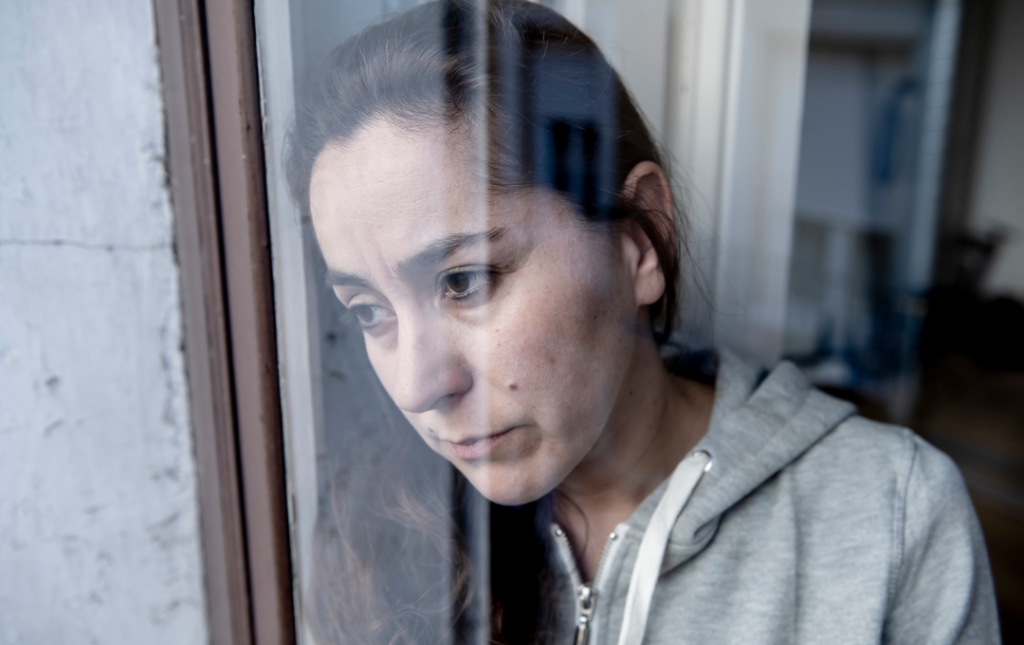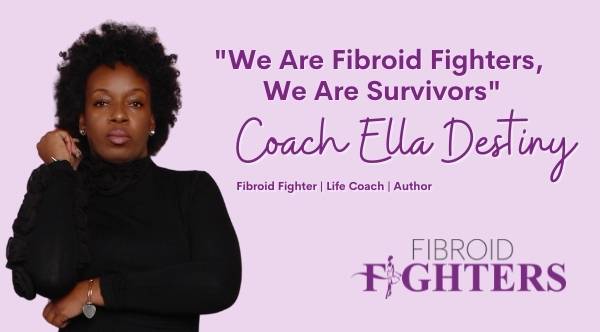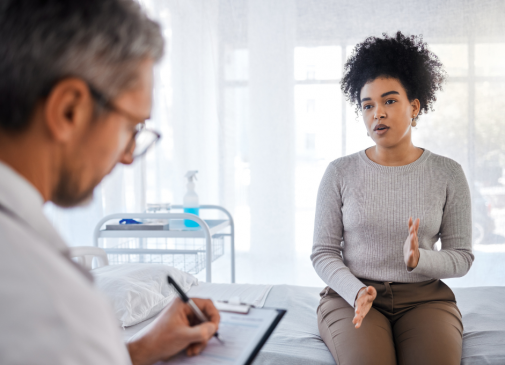
Have you ever considered the emotional toll of fibroids? While the changing seasons can affect our moods, fibroids’ physical and emotional challenges can have a lasting impact. Beyond the physical symptoms, fibroids can significantly influence our mental health. Our emotional, psychological, and social well-being are interconnected, and fibroids can disrupt this balance.1

Symptoms of Depression can include:
- Sadness, weeping, emptiness, or a sense of hopelessness
- Even over little issues, angry outbursts, impatience, or frustration might occur
- Loss of pleasure or interest in most or all usual activities, such as sex, hobbies, or sports
- Insomnia or sleeping too much due to exhaustion and a lack of energy
- Reduced or increased food cravings and weight loss
- Anxiety, agitation, or restlessness
- Slowing down of one’s thoughts, speech, or body motions
- Feelings of inadequacy or remorse
- Problems with thinking, concentrating, making decisions, and recalling information
- Suicidal thoughts or attempts at suicide
- Physical issues that aren’t explained, such as back pain or migraines
Many things can affect depression and the state of someone’s mind, from their environment to the chemical balances in their brains. While depression doesn’t have exact causes, it does have risk factors, such as genetics, trauma, stressful events, and unhealthy habits. Considering that, it’s entirely possible that having a physical illness can kickstart depression and more emotional side effects of fibroids.
How Fibroids Affect Our Emotions
Do fibroids affect emotions? According to a recent study,3 quality of life scores in women with uterine fibroids were lower at baseline than after therapy, indicating severely reduced psychosocial functioning due to emotional causes of fibroids. Patient-reported health problems related to bodily discomfort, mental health, social functioning, and pleasure with sex life were all linked to uterine fibroids and emotions.
“There is an embarrassment factor,” says Eugenia Buie, Fibroid Fighter, “I didn’t want to talk about it. You can’t go to certain places or keep commitments that you’ve made. You’re so tired because your cycle is so heavy. You are anxious that you will have an accident. It wears on you mentally; it wears on you emotionally.”
Uterine fibroids, also called leiomyomas, are hard, compact tumors composed of smooth muscle cells and fibroid connective tissue that can range in size from a seed to a melon. You can have one or several fibroids, and while many people suffer from debilitating symptoms, others have no symptoms.
Fibroid symptoms:
- Heavy and prolonged menstruation between or during your periods
- Anemia, which can lead to fatigue
- Pain during intercourse
- Frequent urination
- Constipation and/or bloating
- Pain in your pelvis or lower back
- Increased menstrual cramping
- Stomach swelling
Fibroids and Stress

So, what are the emotional side effects of fibroids? Are there correlations between fibroids and emotional stress? According to another study4, a majority of participants had strong emotional reactions to the emotional causes of fibroids, such as fear, anxiety, rage, and depression. Half of the participants felt powerless in the face of their fibroids and emotions and believed they had no control over them. Many women had a low self-image and expressed fear about seeming less attractive, making it harder to form personal relationships. Several women felt they needed significant support in dealing with these challenges and the emotional causes of fibroids.
Often, there is a shame surrounding the emotional causes of fibroids. People don’t want to talk about it or admit that they may have it, for the symptoms are very physical and easy to see. Fibroids directly correlate with self-image, as it has physical symptoms such as heavy bleeding and bloating in the stomach area. Sometimes, people can even confuse it for pregnancy, which can be offensive on its own terms. “At the time, I sometimes looked about seven months pregnant in high school,” shares Coach Ella Destiny, another Fibroid Fighter, relaying how fibroids physically changed her appearance, the emotional causes of fibroids, and reinforced insecurities.

Fear and Anxiety
There are emotional causes of fibroids on a person because of the physical toll it takes on women and the social side effects.
Many worry about their sex life due to heavy bleeding, cramps, pain during sex, and constantly needing to urinate – forming the emotional causes of fibroids. Such things such as fibroids and emotions can take a toll on one’s emotions, as they can feel like they’re losing their femininity and sexuality.5
Fibroids can also cause fear, especially when there are other health issues with fibroids. For women dealing with the emotional causes of fibroids, the risk of future health concerns creates tremendous fear and anxiety. This can mean having another health condition or worrying about what treatment options they have – which is indeed an emotional side effect of fibroids. Some fear horrific outcomes from mistakes from surgery; others fear not being able to have their uterus to have children, all due to fibroids and emotions.
Then, there’s the fact that many women do delay getting a diagnosis, if only out of fear of the above. Many women believe what they’re going through is normal and it’s something they “have to put up with as a woman.” Even celebrities face the emotional side effects of fibroids, like British Singer-Songwriter FKA Twigs, who had fibroids – and put treatment off for as long as possible. She had laparoscopic surgery to remove six of the non-cancerous tumors from her uterus in 2018.
“I was working so much, and I was so determined [to] make an album that I knew that I had some sort of growth in my stomach for a long time, and I didn’t do anything,6” Twigs explained
Ever Been Through This?
Share Your StoryResearch Findings On Emotional Side Effects
A 2014 study revealed the significant emotional impact of fibroids, with over half of participants reporting feelings of hopelessness and powerlessness due to heavy bleeding. Many women also expressed concerns about self-image, body weight, and potential fertility issues. These emotional challenges can lead to difficulties in intimate relationships and contribute to feelings of depression.
While managing the physical symptoms of fibroids is crucial, it’s equally important to address the emotional toll. By seeking support, practicing self-care, and exploring various treatment options, you can navigate the challenges of fibroids and maintain your emotional well-being.

Here at Fibroid Fighters, we aim to educate women and people with uteruses about fibroids and all they entail, including fibroids and emotions. Fibroids can have emotional side effects, and it’s important to know how to recognize them so that you can treat them—both the physical symptoms and the emotional symptoms.
For more information about fibroids, symptoms and treatment options, contact us at 855-455-5262 to [email protected].
Works Cited:
- https://www.mentalhealth.gov/basics/what-is-mental-health#:~:text=Mental%20health%20includes%20our%20emotional,childhood%20and%20adolescence%20through%20adulthood.
- https://www.mayoclinic.org/diseases-conditions/depression/symptoms-causes/syc-20356007
- https://pubmed.ncbi.nlm.nih.gov/32474012/
- https://pubmed.ncbi.nlm.nih.gov/25725565/
- http://www.careaboutfibroids.org/toll-of-fibroids.html
- https://www.vogue.com/article/fka-twigs-podcast-fibroid-tumors#:~:text=In%20December%20of%202017%2C%20FKA,%E2%80%9D%E2%80%94removed%20from%20her%20uterus.
- https://www.fertstert.org/article/S0015-0282(14)01471-X/fulltext#relatedArticles







